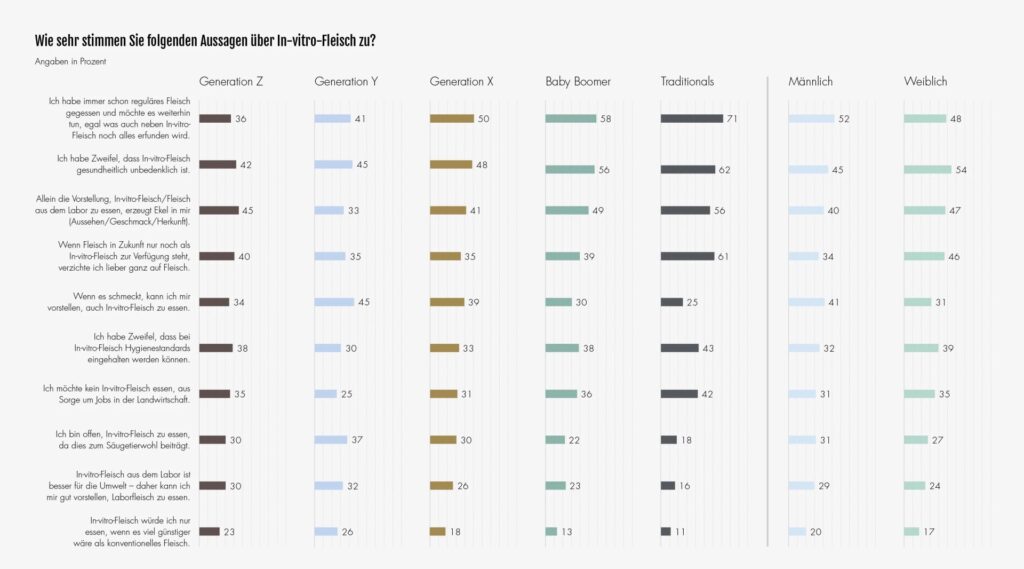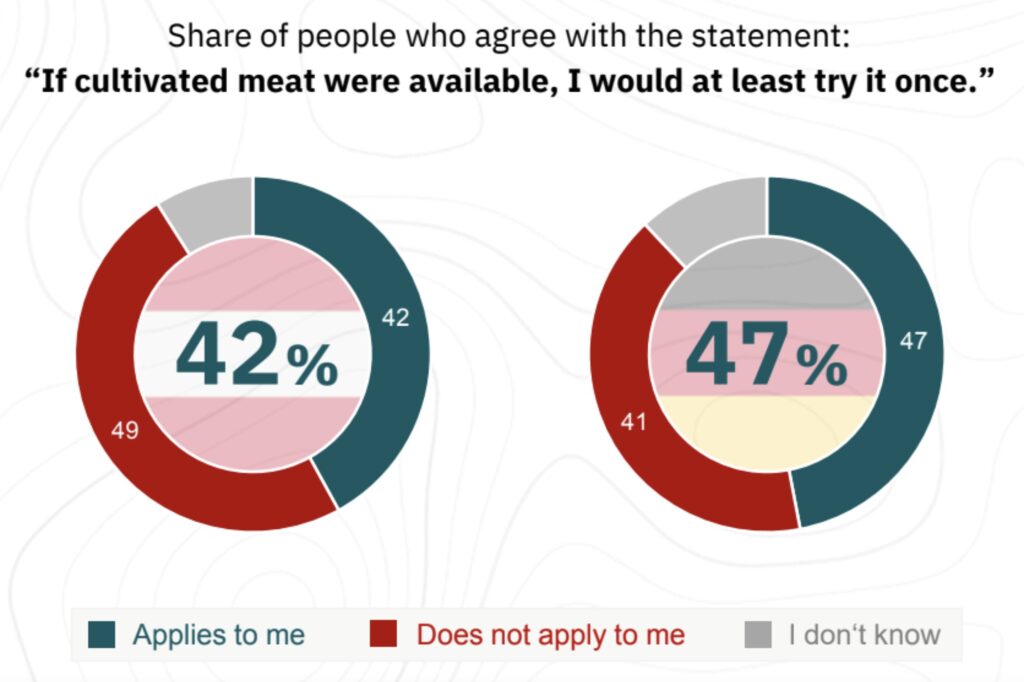In Germany, Gen Zers Are More Receptive to Alternative Proteins – But Health Concerns Remain
5 Mins Read
Young consumers in Europe’s largest market for vegan food are more welcoming of meat analogues, but doubts over processing and health effects persist.
Gen Zers are more likely to be open to plant-based meat than older consumers in Germany, but both demographics share concerns about ultra-processing and their impact on health, according to a new Kantar survey commissioned by food company Heristo.
The 1,015-person poll covered Germans aged 16 to 79, recording their answers based on age, from Gen Z (aged 16-28) to Traditionals (69-79). It found that youngsters trust and are open to buying food produced via new technologies around three times more than older respondents, who are largely worried about the health risks of such foods.
But consumers across the age spectrum agree that health is an important purchase factor for food. “Our study shows how tradition-conscious Germans are when it comes to nutrition. Many respondents have mixed feelings about new technologies and rate the potential risks higher than the benefits,” said Marc Sodeikat, board member for the Human Food division at Heristo.
Plant-based meat suffers from health and cost barriers

Nearly four in five Gen Zers have tried vegan meat alternatives, but this shrinks to just 45% with the Traditionals. And in terms of product satisfaction, a third of the former haven’t found convincing options yet, versus 40% of the latter. Gen X (aged 44-58) seem to be the most satisfied with current meat analogues on the market.
And despite the well-documented climate benefits of plant-based food – which has 75% lower emissions than meat – only four in 10 youngsters recognise these advantages. That number drops to 16% for those aged 69-plus in the survey.
A major concern revolves around health. Gen Zers are the least worried about the ingredients and processing of plant-based meat, but still, a third of them are apprehensive. This grows with age, with half of Gen Xers and 72% of Traditionals expressing their doubts about this.
This trend is almost reversed when it comes to cost – only 27% of Traditionals find meat alternatives too expensive, compared to nearly 40% of Gen Zers and Millennials (aged 29 to 43). At the same time, animal welfare isn’t really a consideration for older generations, though it strikes a chord with around a third of Gen Z and Millennial Germans.
Meanwhile, just under 40% of Gen Zers are satisfied with the taste and texture of plant-based alternatives, and this slumps to one in five for Gen Xers and 12% for Traditionals.
Germans apprehensive about cultivated meat safety

The research also explored German attitudes towards cultivated meat, and found similar trends. Most older consumers aren’t too bothered about these proteins, preferring to continue to eat conventional meat no matter what technologies arise.
But there are doubts over the safety of cultivated meat across the board, ranging from 42% of Gen Zers and 45% of Millennials to 62% of Traditionals. Similarly, between 30-43% of Germans have concerns about the hygiene standards of these foods.
Interestingly, if cultivated products were the only form of meat available in the future, a good chunk of respondents would rather avoid meat altogether. This includes 35% of Millennials and Gen Xers, 39% of Baby Boomers (59-68), 40% of Gen Zers, and 61% of Traditionals.
Moreover, three in 10 of the youngest demographic surveyed say they’re open to cultivated meat because of its climate and animal welfare benefits, but only a sixth of the oldest resonate with this. And less than a quarter of Gen Zers say they’d only eat cultivated meat if it were cheaper than conventional versions, reducing to 11% of Traditionals.
Overall, the survey surprisingly revealed that men are slightly more open to new technologies, including plant-based and cultivated meat products.
Country-wide progress bucks these trends

The survey’s results may seem disappointing for alternative protein startups, but it goes against the grain of other polls, as well as sales data.
For example, a 2,000-person survey by the Good Food Institute in March revealed that 47% of Germans would be willing to try cultivated meat, with 57% finding current meat consumption levels too high. Here, too, men seemed more receptive. And among flexitarians, the interest in cultivated meat rises to 58%.
Germany remains Europe’s largest plant-based market, making up 40% of retail sales (in a six-country analysis) in 2023. It also accounts for nearly half (46%) of all plant-based meat sold in the continent, which raked in 6% more revenue than the year before.
The number of households eating meat analogues has also increased, from 34% in 2021 to 37% last year. And this will only continue to rise, as the revised national dietary guidelines encourage Germans to make 75% of their diets plant-based.
Retailers like Lidl, Kaufland, Aldi and the Rewe Group are lowering the prices of own-label plant-based meat and dairy to match or outperform their animal-based counterparts. Even large chains such as Burger King are doing the same. Meanwhile, the federal government earmarked €38M in its 2024 Budget to promote alternative protein consumption and a switch to plant-based agriculture, as well as open a Proteins of the Future centre.
“The results show how much potential there is in new concepts if the advantages can be communicated correctly; for example, the convenience character, animal welfare or the aspect of healthy nutrition,” Sodeikat said of the survey.



